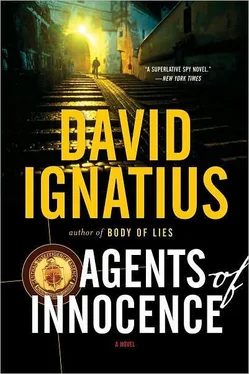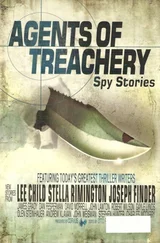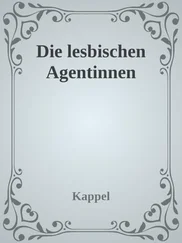David Ignatius - Agents of Innocence
Здесь есть возможность читать онлайн «David Ignatius - Agents of Innocence» весь текст электронной книги совершенно бесплатно (целиком полную версию без сокращений). В некоторых случаях можно слушать аудио, скачать через торрент в формате fb2 и присутствует краткое содержание. Жанр: Шпионский детектив, на английском языке. Описание произведения, (предисловие) а так же отзывы посетителей доступны на портале библиотеки ЛибКат.
- Название:Agents of Innocence
- Автор:
- Жанр:
- Год:неизвестен
- ISBN:нет данных
- Рейтинг книги:3 / 5. Голосов: 1
-
Избранное:Добавить в избранное
- Отзывы:
-
Ваша оценка:
- 60
- 1
- 2
- 3
- 4
- 5
Agents of Innocence: краткое содержание, описание и аннотация
Предлагаем к чтению аннотацию, описание, краткое содержание или предисловие (зависит от того, что написал сам автор книги «Agents of Innocence»). Если вы не нашли необходимую информацию о книге — напишите в комментариях, мы постараемся отыскать её.
Agents of Innocence — читать онлайн бесплатно полную книгу (весь текст) целиком
Ниже представлен текст книги, разбитый по страницам. Система сохранения места последней прочитанной страницы, позволяет с удобством читать онлайн бесплатно книгу «Agents of Innocence», без необходимости каждый раз заново искать на чём Вы остановились. Поставьте закладку, и сможете в любой момент перейти на страницу, на которой закончили чтение.
Интервал:
Закладка:
Fuad sat down in the street and sobbed.
It was a large and well-designed bomb, detonated by remote control, containing the equivalent of 50 kilos of TNT. The explosion was very powerful, even by Beirut standards. It killed twelve people and injured seventeen.
Fuad eventually got up off the street and went back to his hotel. He could not bear to pass near the scene of the bombing. The Verdun area was swarming with people now. Fatah security men, policemen, Lebanese security men, journalists, curious thrillseekers. Fuad wanted to be anywhere else. He stayed in his room and closed the curtains so that it was dark at midday.
When the radio announced several hours later that Jamal Ramlawi had died on his way to the hospital, Fuad slashed his wrist. He watched it bleed for ten minutes and then applied a tourniquet. Even his grief was useless.
PART X
Epilogue London; 1984
London; 1984
Fuad survived the anguish of that first car bombing. But Rogers’s death in the embassy bombing four years later broke his spirit. Fuad decided then that he had seen enough of Lebanon-and enough of the Americans-and moved to London. The agency offered him a handsome settlement, asked him to sign a contract pledging eternal silence about his intelligence activities, and then wished him well. It was easy enough to let Fuad go. Other than Rogers, no one had ever really known him.
Fuad bought himself a flat in London, in a modern building north of Hyde Park called the Pentangle. It was an odd neighborhood, once the home of the prostitutes who serviced the gentlemen who lived south of the Park. Now it was composed almost entirely of foreigners. Saudis, Nigerians, Iranians, Lebanese, Kuwaitis, Venezualans. A modern class of whores. People who had made money abroad and, for whatever reason, had found it prudent to settle down in London. Fuad loved the neighborhood. It was the perfect place to hide.
Fuad bought himself a dog, an enthusiastic Yorkshire terrier, which he liked to take on walks in the park. And as he took these walks, out in the open spaces of London, he turned over in his mind the events he had witnessed in Lebanon, the deaths of Jamal and Rogers and so many thousands more.
The news from Lebanon seemed to get worse, week by week. In October 1983, a truck bomb exploded outside the Marine barracks at the Beirut Airport, killing 241 people. The United States reacted like a wounded Cyclops, bellowing, flailing about, making a loud noise but doing little damage. A World War II battleship lobbed shells the size of Volkswagens at Druse militiamen in the Lebanese mountains. Navy planes dropped iron bombs on Syrian gun positions. This display of firepower did not impress the local warlords. The foreign minister of Syria summed up the local sentiment when he remarked that the Americans seemed “short of breath.” In February 1984, to the surprise of no one, the Americans pulled up their tents and fled from Lebanon, leaving a situation far messier-and infinitely greater in human misery-than when they had first begun to play the role of benevolent proconsul several decades before.
One day, when Fuad had been in London nearly a year, he walked into an electronics shop on the Edgware Road and bought himself a tape recorder. He took it back to his apartment and began dictating a message for the one American to whom he felt he owed an explanation-Frank Hoffman, the man who had first spotted him, recruited him, and introduced him to Tom Rogers. He recorded many different versions of the message, and finally settled on one that said most of what he felt. He sent it to Hoffman in Saudi Arabia.
When Hoffman received the tape, he listened to it once, had his secretary transcribe it, and then destroyed it. It did no one any good. He sent the transcript to Edward Stone in Washington. The transcript read as follows:
“Effendi:
“I have been trying for a very long time to understand what went wrong for my friends the Americans in Lebanon. Now I see a part of the story, and I think I should tell you. It is hard for Arabs to talk plainly and honestly. Usually we do the opposite. But I will try.
“I will begin by telling you a proverb that I told my friend Tom Rogers the morning before he died, when we had breakfast together. It is a hadith, a saying of the Prophet Mohammed, and it is as follows:
“A simple Bedouin in the desert asks the Prophet: ‘Should I let my camel loose and trust in God?’
“ ‘No,’ says the Prophet. ‘Tie down your camel and trust in God.’
“That hadith expresses what we Arabs understand and you do not. Promises and good intentions are less than nothing. This is a land of liars. Do you perhaps understand the meaning of this proverb, Mr. Hoffman? I want to think that Rogers did, but I am not sure. With Rogers, I always thought he understood everything, until later, when I began to think back, I was not so sure. When I told him the hadith about tying down the camel that morning in Beirut, he said, ‘Trust us.’ But I think that was the problem. Look what happened. He is dead.
“What I think I have learned, Mr. Hoffman, is something about the United States. At first, after Rogers was killed, I thought that all of you were incompetent. But now I realize that it is more complicated than that.
“I will try to explain. When you first met me, I was in love with America. I was only twenty. America is an easy country to fall in love with at that age. When we are twenty, we think that anything is possible, and we don’t worry about failing because we will always have a second chance. That was what seemed so liberating about America-that sense of possibility-but perhaps I was just in love with being young.
“Was there ever anyone easier to recruit than me, Mr. Hoffman? I recruited myself. And I have never regretted working for you. Not even for one day. I know that many Arabs criticize you now, but I am not one of them. The agency was the part of America that I liked the best, the part that understood the way the world is. It is easy to have the ideals of a twenty-year-old, but you need the cunning of a fifty-year-old to achieve them. When I met you and Mr. Rogers, I thought, Maybe there is a chance. Maybe these Americans have the toughness. I thought: These men are cynical enough to do good. And that was when I began to think that America truly could liberate the Arab world.
“I was wrong. Americans are not hard men. Even the CIA has a soft heart. You want so much to achieve good and make the world better, but you do not have the stomach for it. And you do not know your limitations. You are innocence itself. You are the agents of innocence. That is why you make so much mischief. You come into a place like Lebanon as if you were missionaries. You convince people to put aside their old customs and allegiances and to break the bonds that hold the country together. With your money and your schools and your cigarettes and music, you convince us that we can be like you. But we can’t. And when the real trouble begins, you are gone. And you leave your friends, the ones who trusted you most, to die.
“I will tell you what it is. You urge us to open up the windows of heaven. But you do not realize that the downpour will come rushing through and drown us all.
“I have been thinking about why Jamal died, and why Rogers died. And I finally realized: They are linked. They are the same story.
“Jamal died because of what I was just saying about America. You seduce us to work with you, but you are not strong enough to protect us. Jamal said something to me once, which I will always remember. It haunts me now. We were having an argument about working for the Americans. He told me that I shouldn’t trust the Americans, because they would never truly love the Arabs. I told him he was wrong. Rogers and the agency were sincere, I said.
Читать дальшеИнтервал:
Закладка:
Похожие книги на «Agents of Innocence»
Представляем Вашему вниманию похожие книги на «Agents of Innocence» списком для выбора. Мы отобрали схожую по названию и смыслу литературу в надежде предоставить читателям больше вариантов отыскать новые, интересные, ещё непрочитанные произведения.
Обсуждение, отзывы о книге «Agents of Innocence» и просто собственные мнения читателей. Оставьте ваши комментарии, напишите, что Вы думаете о произведении, его смысле или главных героях. Укажите что конкретно понравилось, а что нет, и почему Вы так считаете.












